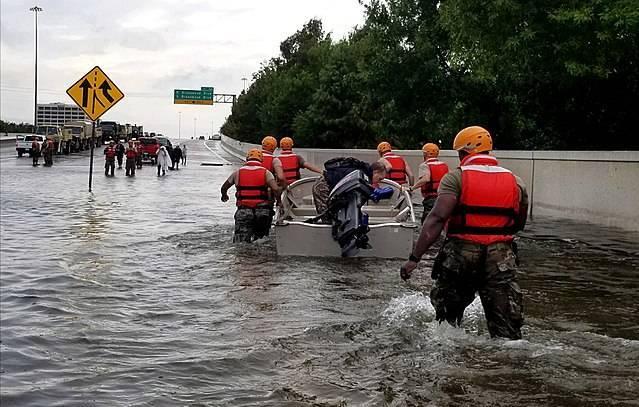
While companies and celebrities are stepping forward to help secure funds and supplies for post- Hurricane Harvey relief, a coalition of non-profit groups have urged political leaders to ensure that public funds for aid go to the people that need it most – and not to companies that they argue have had leading roles in creating the mess that will take years to cleanup.
In a letter, signed by over 130 NGOs including 350.org, Friends of the Earth, Greenpeace and the Sierra Club, these various groups demand that recovery funds make their way to local communities that can benefit from relief funds. They worry that energy and petrochemical companies will unfairly benefit, even though from their point of view, these industries have “compounded” Harvey’s impact far beyond southeastern Texas.
The organizations released this letter a week after Marvin Odum, formerly head of Shell’s U.S. operations, was appointed as the leader of recovery efforts in Houston. With Odum tapped to direct the post-Harvey relief and cleanup efforts, NGO leaders say they are concerned that public funds could be used to compensate companies whose greenhouse gas emissions could have contributed to the hurricanes. Almost one month after Harvey walloped Texas, these groups can easily emphasize their point considering Hurricanes Irma, Jose and Maria have wreaked their fair share of havoc across the Caribbean and adjacent regions.
"For years, Texas state government has prioritized oil, gas, and chemical industry profits ahead of the public interest, and Texans have paid the price with their health, their property, and their environment," says Earthworks South Texas Organizer Priscilla Villa in a public statement. "Harvey must be the event that changes our government from industry lackeys into public leaders who accept the reality of climate change and act on it by quickly moving away from dirty fossil fuels and plastics and towards a renewable energy future."
The damage Harvey left behind includes pollutants from over 400 water treatment plants that could have contaminated soil and waterways across coastal Texas and Louisiana. Those risks are in addition to the damage local refineries suffered during Harvey. But despite suggestions that as many as 4.6 million pounds of chemicals may have leaked due to the hurricane, a local Environmental Protection Agency laboratory that could have a role in gauging the level of cleanup needed is still scheduled to be closed. Having a former energy company executive lead this recovery, therefore, makes local activists and non-profits worry that money and resources will not be fairly and transparently distributed.
NGOs point to the recovery effort that followed Hurricane Katrina in 2005. Following that disaster, these groups charge that billions of dollars that were needed to rebuild communities were instead largely disbursed to energy and petrochemical companies. They cite an estimate that concluded such companies received as much as 65 percent of proceeds from tax-except bonds issued by Louisiana’s state government in the years following that hurricane.
Funds for the Harvey relief effort, these groups insist, should offer opportunities for families and local businesses to rebuild, while other investments could be made to mitigate public health and other risks last month’s hurricane left behind. “In order for these dialogs to begin in earnest and begin to yield results, federal and state recovery dollars must be directed to affected families and communities, not to oil, gas, and petrochemical companies,” concluded the letter.
Image credit: U.S. Army/Wiki Commons

Leon Kaye has written for 3p since 2010 and become executive editor in 2018. His previous work includes writing for the Guardian as well as other online and print publications. In addition, he's worked in sales executive roles within technology and financial research companies, as well as for a public relations firm, for which he consulted with one of the globe’s leading sustainability initiatives. Currently living in Central California, he’s traveled to 70-plus countries and has lived and worked in South Korea, the United Arab Emirates and Uruguay.
Leon’s an alum of Fresno State, the University of Maryland, Baltimore County and the University of Southern California's Marshall Business School. He enjoys traveling abroad as well as exploring California’s Central Coast and the Sierra Nevadas.














